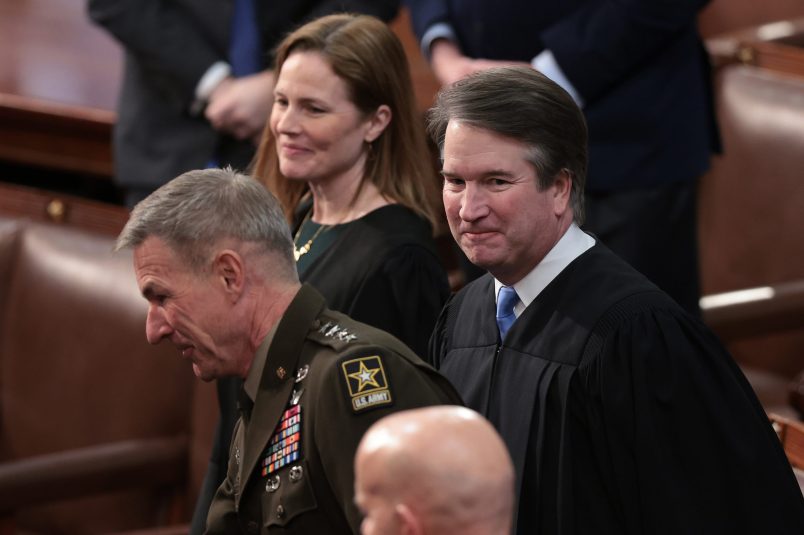The Supreme Court’s decision today to take up Moore v. Harper set off alarms across the election law world. The case offers a dramatic reimagining of the balance of powers at the state and federal level. And, importantly, the legal theory at the heart of the case shares considerable DNA with the animating theory that Trump and his cronies drew on as they sought to get the courts to overturn the 2020 election.
Before the election in November, Trump’s allies began challenging some of the changes to election rules that were made in swing states in order to facilitate a presidential election during a pandemic. Trump’s team argued the changes were a violation of the “Independent State Legislature” theory — a controversial legal doctrine popular on the right that essentially argues that because the Constitution delegates some election-related tasks to state legislatures, state courts, election officials and governors don’t have any authority to interfere in federal election-related litigation at all. It’s a sweeping take on election law that puts the sole authority over election-related matters with the state legislature.
As we know, those efforts from Trump’s legal team ultimately failed. But the independent state legislature theory, which first reared its head in Justice William Rehnquist’s concurring opinion on Bush v. Gore, wasn’t going anywhere.
Back to today’s Moore v. Harper news: Earlier this year, four of the conservative justices — Thomas, Alito, Gorsuch, and Kavanaugh — suggested in a dissent that it was time for the Court to examine the independent state legislature theory.
Today, they essentially announced they will do just that. Moore v. Harper is focused on congressional maps in North Carolina. After voters challenged a congressional district map drawn by the state legislature that heavily favored Republican candidates, the North Carolina Supreme Court struck down the gerrymandered congressional districts and drew up a fairer map. In Moore v. Harper, North Carolina Republicans use the independent state legislature theory to argue that the state Supreme Court overstepped its constitutional authority in striking down the map.
My colleague Kate Riga outlines the basis of why some believe the independent legislature theory is enshrined in the Constitution here:
The Elections Clause of the Constitution gives state legislatures the power to dictate the “times, places and manner” of holding elections. The Electors Clause gives state legislatures the power to appoint presidential electors in the “manner” they choose.
The conservatives [on the high court] are interpreting those two clauses to empower state legislatures, solely, to the exclusion of state courts. Legislatures would get to craft voting regulation, redistricted maps, election rules — all without any judicial review. A maximalist embrace of the independent state legislature theory would mean that state constitution provisions and voter-passed initiatives on elections would not apply, and that state courts would have no place intervening in election litigation.
As my colleague Matt Shuham reported today, if SCOTUS were to side with the Republicans who challenged the North Carolina Supreme Court’s authority in this case, the ruling would dramatically increase the authority state legislatures have over federal elections moving forward. That’s a problem in general, but one made more dire by the failed coup we witnessed in 2020 as Trump and his allies tried everything in their power to overturn the 2020 election and spread lies of a stolen election. While they failed to keep Trump in power, those Big Lie efforts were not in vain. Since 2020 we’ve seen plenty of Big Lie adherents win elections at the state level, packing swing state legislatures with those loyal to the Big Lie.
As former Judge J. Michael Luttig outlined in this CNN op-ed, if the Supreme Court rules on Moore v. Harper in a way that sets independent legislature theory as precedent, it’ll give new life to several of the foiled layers of Trump’s 2020 election overturning crusade heading into 2024. It will limit the authority of state courts on all kinds of election litigation issues, including, extremely worryingly, if and when state legislatures attempt to appoint illegitimate presidential electors. Those alternate electors — clearly phony in 2020 — might have a true claim to legitimacy by 2024:
Forewarned is to be forearmed.
Trump and the Republicans can only be stopped from stealing the 2024 election at this point if the Supreme Court rejects the independent state legislature doctrine (thus allowing state court enforcement of state constitutional limitations on legislatively enacted election rules and elector appointments) and Congress amends the Electoral Count Act to constrain Congress’ own power to reject state electoral votes and decide the presidency.
The Best Of TPM Today
Here’s what you should read this evening:
Catch up on all of Kate Riga’s coverage of today’s SCOTUS EPA ruling:
Supreme Court Rules On Major EPA Case With Roberts Writing For Majority
Kagan Turns Conservative Justices’ Recent Love Affair With History Against Them In EPA Case
Kagan Calls EPA Decision What It Really Is: Hostility To Agency Power
Gorsuch Continues His Family Tradition Of Dismantling The EPA
Breyer retires: Justice Breyer Retires, Leaving Warnings In His Wake and Ketanji Brown Jackson joins the high court: Ketanji Brown Jackson Is Sworn In As First Black Woman On Supreme Court
In Jan. 6 news, this: Jan. 6 Committee Slaps Pat Cipollone With Subpoena
And this: Ex-Trump WH Aide Details Why Hutchinson Switched Lawyers
And this: Trump Whines Mid-Newsmax Interview That Newsmax Isn’t Lying About Election Hard Enough
Matt Shuham’s piece on SCOTUS granting certiorari on Moore v. Harper: SCOTUS Will Hear Case Next Term That Could Transform Election Law
On the abortion front: Biden Announces Support For Abortion Rights Filibuster Exception
Yesterday’s Most Read Story
Talk (On Background) Is Cheap — Josh Marshall
What We Are Reading
Postcards from Earth’s climate futures — The Washington Post
Instagram and Facebook remove posts offering abortion pills — Amanda Seitz
Here’s To Mike Davis, A Titan — Patrick Redford


